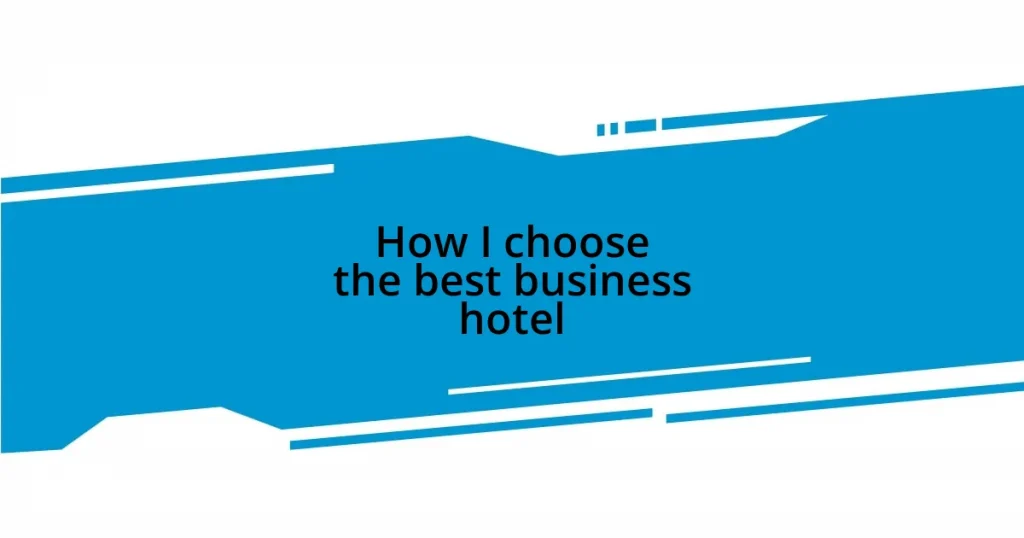Key takeaways:
- Essential factors for a good business hotel include strong Wi-Fi, meeting spaces, and quality dining options to enhance productivity and comfort.
- Location is crucial; proximity to business hubs and local amenities can significantly improve efficiency during work trips.
- Evaluating hotel amenities, such as business centers and customer service, is vital for a smooth travel experience.
- Checking reviews and utilizing loyalty programs can lead to better hotel choices and memorable experiences during business travels.
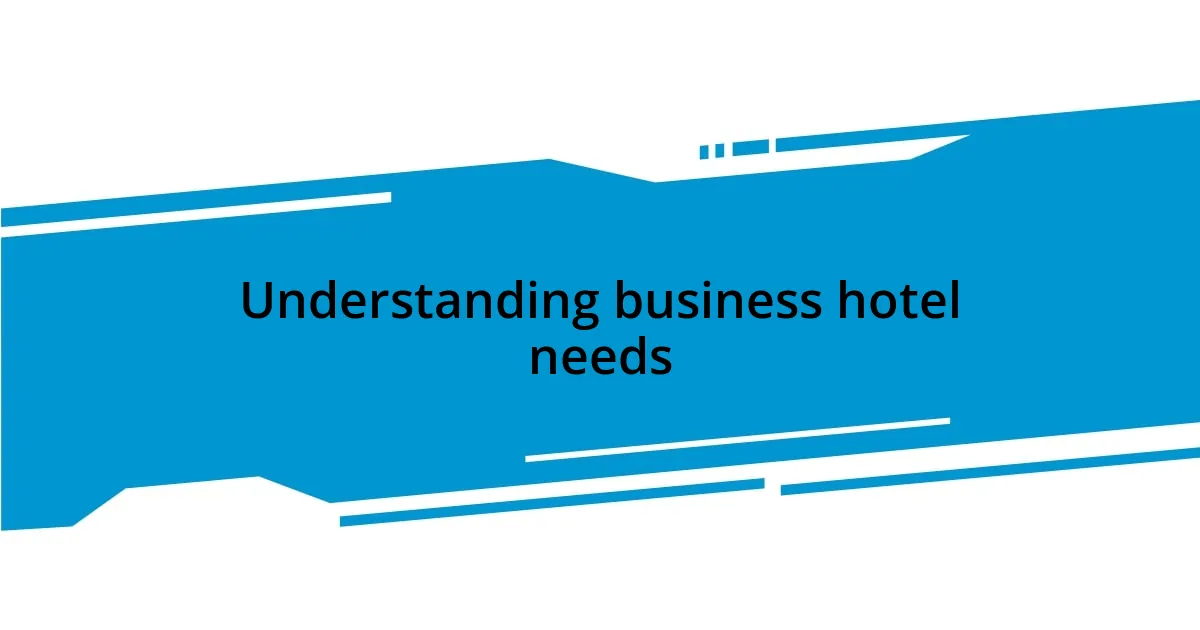
Understanding business hotel needs
When I think about what makes a good business hotel, the essentials often come to mind: a strong Wi-Fi connection, reliable service, and convenient locations. Can you imagine trying to conduct a critical video conference with a shaky connection? It’s stressful! I always prioritize spaces that allow me to work efficiently without disruptions, knowing that my productivity hinges on these factors.
Another need that stands out for me is the availability of meeting spaces. I remember a time when I booked a hotel only to discover the meeting room was already full despite earlier assurances. What a disappointment that was! It made me realize that a dedicated work environment is as crucial as a comfortable bed when I’m traveling for business. These spaces need to not only be functional but also inspiring to help foster good ideas and productive discussions among team members.
Lastly, let’s not forget the importance of good food and ambiance. After a long day of meetings, I truly appreciate unwinding with a nice dinner. I often find that hotels with excellent on-site dining options can create a more relaxed atmosphere that helps me recharge for the next day’s agenda. Don’t you agree? A well-balanced mix of professional amenities and personal comfort is what ultimately makes a business hotel feel right for me.
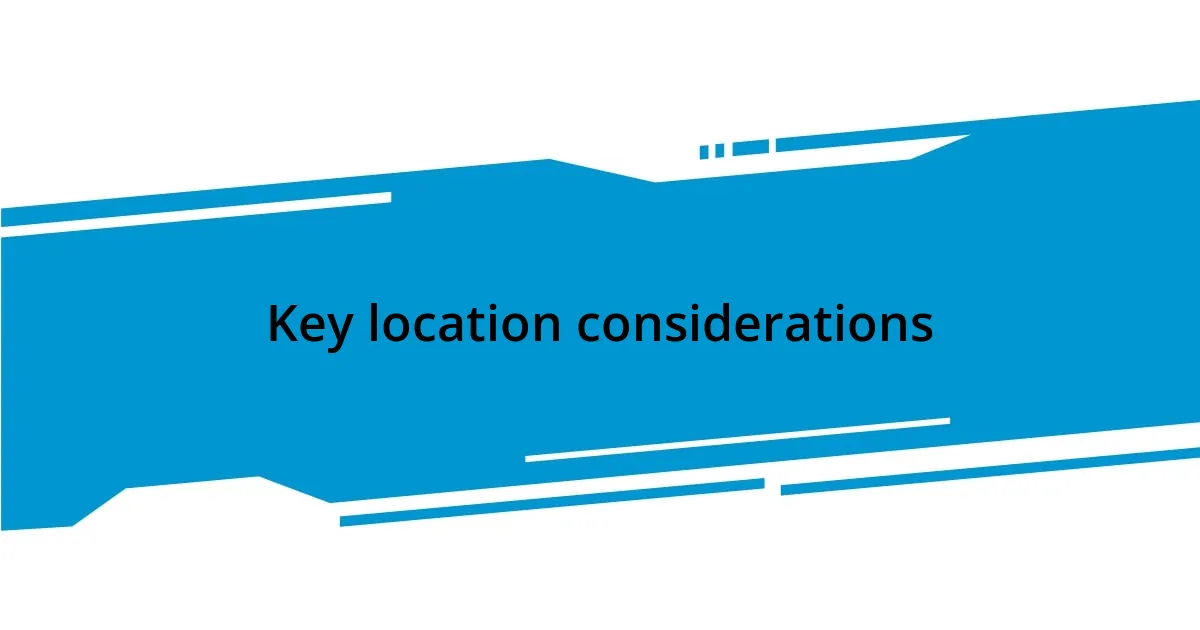
Key location considerations
When it comes to choosing the right business hotel, the location plays a pivotal role. For example, I once stayed at a hotel right next to a major conference center, which was incredibly convenient. I could pop back to my room for a quick recharge between sessions, and it saved me precious time on commute. In my view, you should always consider the proximity to key venues such as client offices, airports, and local attractions; this can enhance both efficiency and enjoyment during a work trip.
Key factors to consider include:
- Proximity to Business Hubs: Being close to the places you’ll be conducting meetings can minimize travel stress.
- Accessibility to Transportation: Look for hotels near public transportation or major roads, ensuring easy access for your travels.
- Local Amenities: Consider what’s nearby—restaurants, cafes, or fitness centers can add value to your stay.
- Safety of the Area: A safe neighborhood can significantly contribute to peace of mind while traveling for work.
- Noise Levels: Hotels situated in quieter areas can foster a more productive environment for both work and rest.
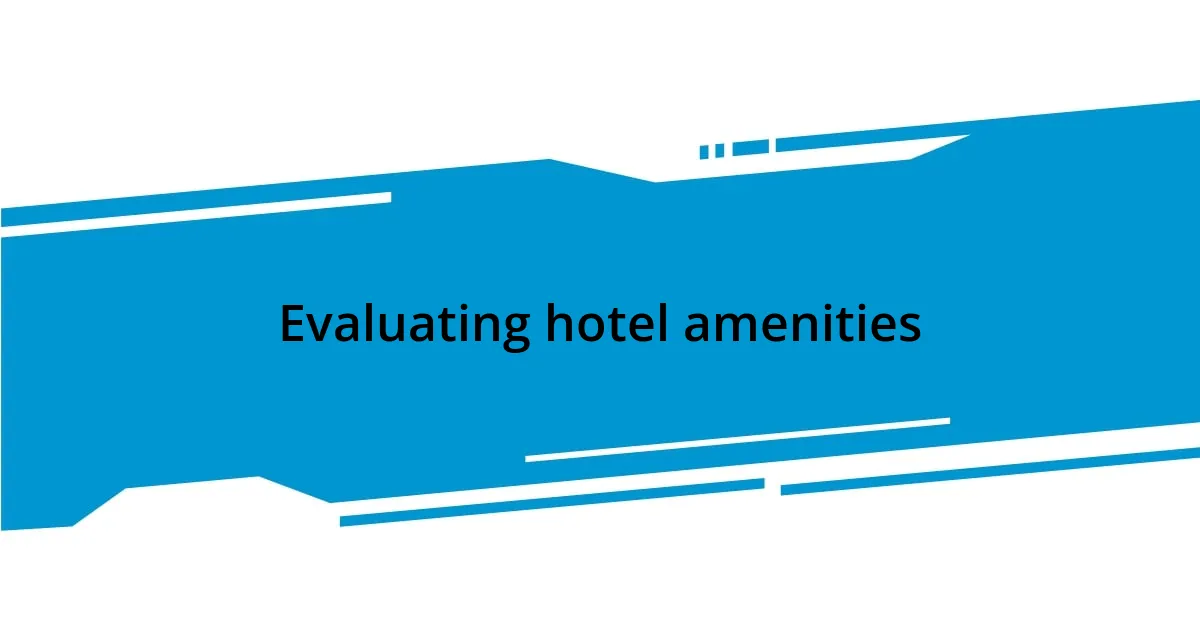
Evaluating hotel amenities
When evaluating hotel amenities, I always consider what will make my work trip more manageable. For me, essential amenities include a business center equipped with copiers and printers, as I often find myself needing to finalize documents. I remember a time when I didn’t check beforehand and had to scramble around the hotel just to print a crucial contract. That experience taught me to always verify such details beforehand!
Another aspect I find significant is the availability of leisure facilities such as gyms or spas. After a long day of meetings, the last thing I want is to be cooped up in my room. On one particular trip, I stumbled upon a hotel with a fantastic rooftop pool. The refreshing dip after a tiring day not only rejuvenated me but also cleared my mind, making me more prepared for the next day. It’s these little luxuries that remind me to balance work and relaxation.
Equally important is the level of customer service. I once encountered a hotel staff member who took the time to understand my needs and provided tailored recommendations for local dining options. This personalization made my stay much more enjoyable. Ultimately, I believe that the right mix of amenities can enhance my overall experience and productivity during business trips.
| Amenity | Why It Matters |
|---|---|
| Strong Wi-Fi Connection | Essential for seamless communication and productivity |
| Business Center | Provides necessary tools like printers and copiers |
| Meeting Spaces | Accommodates discussions, presentations, and collaboration |
| Fitness and Leisure Facilities | Allows for relaxation and recharges after intense work hours |
| Personalized Customer Service | Enhances the overall experience and addresses specific needs |
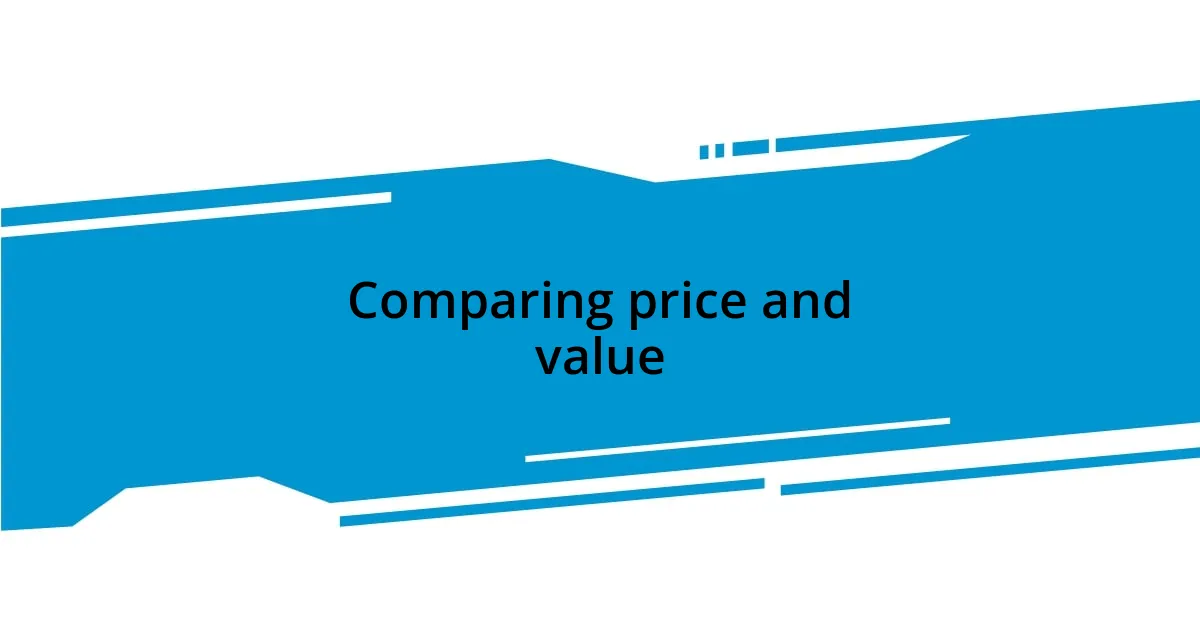
Comparing price and value
When I look at hotel pricing, I don’t just consider the numbers; I think about the true value each place offers. For instance, there was a time I opted for what seemed like the cheaper option. However, I ended up paying more due to hidden fees for Wi-Fi and parking that I hadn’t anticipated. It’s an unwelcome surprise that still sticks in my mind. This taught me the importance of assessing what the price covers and ensuring there are no unexpected costs lurking in the fine print.
One of the best ways to gauge value is to compare the offerings of different hotels. Last year, I was torn between two hotels: one was slightly cheaper but lacked a gym and breakfast, while the other was a bit pricier but had top-notch amenities and complimentary meals. I chose the higher-priced option because I knew that starting my day with breakfast saved me time and boosted my productivity. Have you ever made a choice for convenience over cost? It can often lead to better overall satisfaction.
Ultimately, I’ve learned that paying a little more upfront often results in long-term savings, not just financially but in terms of energy and peace of mind. A hotel stay that feels right can transform a hectic business trip into a pleasurable experience. When I reflect on my past choices, it’s clear that investing in comfort and quality pays off in a big way; it’s all about striking that perfect balance between what’s being offered and what I truly need for a successful trip.
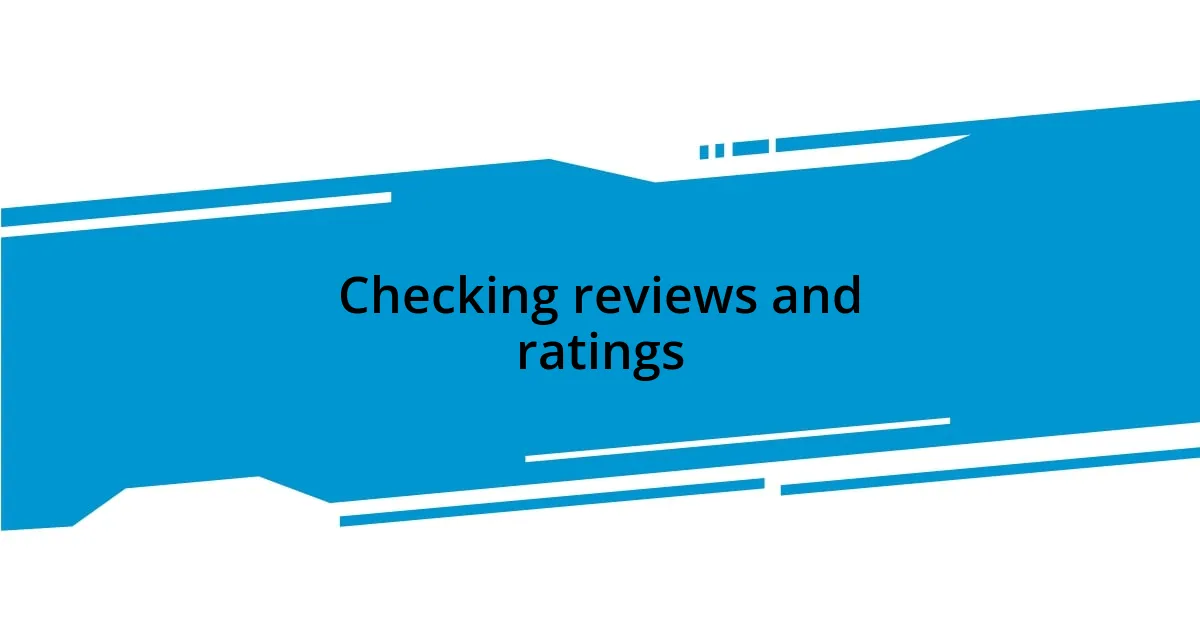
Checking reviews and ratings
When I’m checking reviews and ratings, I dive deep into what past guests are saying. I often find that these insights reveal more about the hotel’s atmosphere than marketing descriptions ever could. Once, I booked a hotel based entirely on its star rating, only to arrive and discover it felt more like a crowded hostel. Those reviews really made me appreciate the nuance behind the numbers.
I also pay attention to the patterns in feedback. For instance, if multiple reviews mention a lack of cleanliness or subpar service, it raises a red flag for me. There was a time during a hectic conference when I ignored such warnings, thinking I could manage. That experience turned into a small disaster when I found my room in disarray. From that moment, I vowed not to overlook the recurring comments from fellow travelers.
Lastly, I love reading recent reviews to get a sense of the current management and upkeep. Have you ever noticed how a hotel can shine one year and then fade the next? During a business trip last summer, I chose a place with glowing recent reviews about improvements in service. That decision paid off as I was greeted with smiles and responsive staff, making my stay memorable. Ultimately, I’ve learned that reviews are like a conversation with fellow travelers and can guide you toward a more satisfying hotel experience.
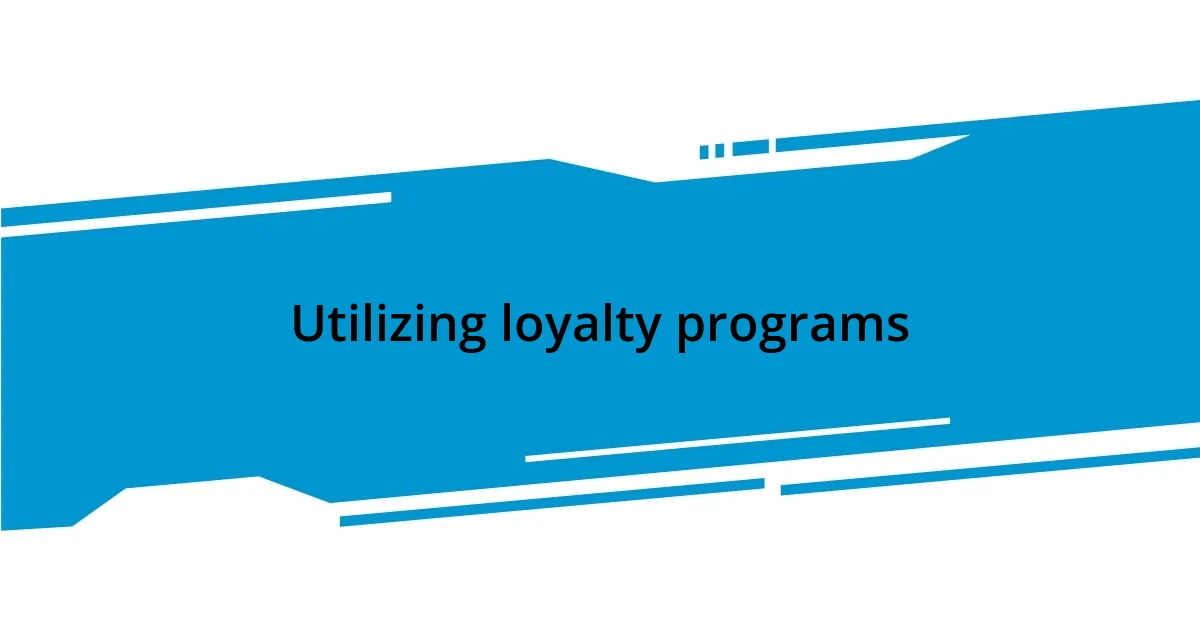
Utilizing loyalty programs
Utilizing loyalty programs in my hotel choices has been a transformative experience. From my perspective, it’s not just about accruing points; it’s about maximizing the benefits that come along with them. I recall using a loyalty program during a series of back-to-back business trips. I was pleasantly surprised to find myself upgraded to a nicer suite simply because I had remained loyal to the chain. That upgrade made my stay so much more enjoyable, proving that these programs can truly enhance the travel experience.
What I’ve noticed is how loyalty programs often offer perks that go beyond the basics—with things like late check-out or complimentary breakfasts. I remember a trip where this little advantage allowed me to have a relaxed morning, where I enjoyed my coffee while reviewing notes for an important meeting. That morning set a positive tone for my day. Have you ever had a moment where a small gesture made a significant difference in your experience? Loyalty programs can do just that.
Additionally, many loyalty programs have partnerships with local businesses, which can provide unique opportunities. During one of my travels, the hotel where I stayed offered discounts at nearby restaurants. That surprise not only made dining out affordable but also allowed me to explore the local dining scene, enhancing my overall experience. I’ve found that leveraging these connections creates memorable moments that enrich my stays, transforming mundane business trips into adventures. So, the next time you book a hotel, consider how loyalty programs can serve your needs and elevate your travels.











